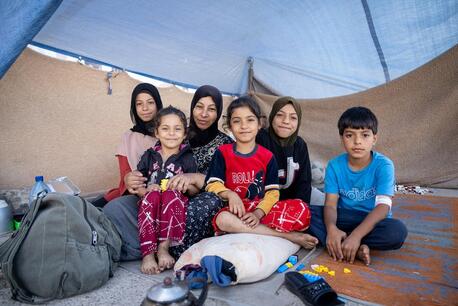
Rising Air Pollution Is Killing the World's Most Vulnerable Children
Pneumonia is the single leading cause of death among children under five years old. But it's one of the easiest diseases to prevent, and we all have a part to play in keeping children safe from the disease.
Pneumonia is responsible for around 1 million childhood deaths every year. Globally, it is the single leading cause of death among children under five years old. Although it's one of the easiest diseases to prevent, rising air pollution is making children in poor communities more susceptible to the disease.
One million deaths each year, easily preventable
A new UNICEF report, One Is Too Many: Ending Child Deaths From Pneumonia and Diarrhea, details the impact air pollution is having on the world's poorest and most vulnerable children. 300 million children, almost one in seven, live in areas where the air is highly toxic. Sometimes the air is so polluted, it exceeds health guidelines by a factor of six or more. This makes them much more susceptible to pneumonia.
Most pneumonia deaths are concentrated in South Asia and sub-Saharan Africa. Here, a government vaccinator prepares a vaccine for pneumonia for a child in Pakistan. © UNICEF/UNI181947/Zaidi
Around 2 billion children live in areas where outdoor air pollution is higher than international limits. And while pneumonia deaths have declined globally over the past decade, it still kills far too many children.
A disease determined by poverty
The disease—and how many kids it kills—is determined greatly by poverty. Low and middle-low income countries are home to 62 percent of kids under five, but have 90 percent of global pneumonia deaths. Contrast that with high income countries, which account for less than 1 percent of pneumonia deaths for kids under five.
We all must do our part. Urgent action is needed by governments, communities and households to reduce air pollution.
One Is Too Many notes that most children afflicted by pneumonia come from areas with poor health services and unsanitary conditions, where people are highly exposed to environmental pollutants.

UNICEF is supporting nutrition screenings and the distribution of vitamin A supplements, which boost immune function, to help fight off pneumonia. © UNICEF/UNI9445/Pirozzi
But pneumonia deaths can be stopped. 8.7 million pneumonia deaths were avoided between 2001 and 2015. Last year alone, concerted efforts to control pneumonia infections through prevention and treatment averted an estimated 1 million or more deaths.
With our effort, these children can be saved
There is hope. Children can be saved from the deadly effects of pneumonia. But it will take effort: UNICEF programs work to increase children’s access to healthcare, to get them vaccinated against pneumonia, and to help children be more resilient to the effects of air pollution.

Baby Abinet, from Ethiopia, has pneumonia at just three months old. Pneumonia kills more children than AIDS, malaria and tuberculosis combined every year. © UNICEF/UNI169762/Clark
UNICEF is implementing projects to protect children from deadly pollution in their homes — by providing low-pollution cooking stoves in countries like Bangladesh — and advocating for action to reduce the impact of outdoor air pollution on children’s health in countries like Mongolia and Indonesia.
We must all have a role in saving children's lives
We all must do our part: Urgent action is needed from governments, communities and households to reduce air pollution. Reducing fossil fuel consumption, using clean cooking stoves, cleaner waste management systems, and better urban planning, can all reduce children’s exposure to toxic air pollution.
Read the report, One Is Too Many: Ending Child Deaths From Pneumonia and Diarrhea, here.
Stand for Hope: Support UNICEF's efforts to save children's lives.
HOW TO HELP
There are many ways to make a difference
War, famine, poverty, natural disasters — threats to the world's children keep coming. But UNICEF won't stop working to keep children healthy and safe.
UNICEF works in over 190 countries and territories — more places than any other children's organization. UNICEF has the world's largest humanitarian warehouse and, when disaster strikes, can get supplies almost anywhere within 72 hours. Constantly innovating, always advocating for a better world for children, UNICEF works to ensure that every child can grow up healthy, educated, protected and respected.
Would you like to help give all children the opportunity to reach their full potential? There are many ways to get involved.




